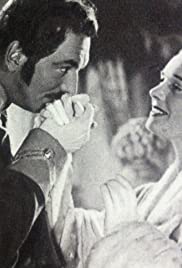
ELIZABETH OF LADYMEAD
UK, 1948, 97 minutes, Colour.
Anna Neagle, Hugh Williams, Isabel Jeans, Michael Lawrence, Bernard Lee, Nicholas Phipps, Michael Shepley, Hilda Bayley, Henry Edwards, Jean Anderson.
Directed by Herbert Wilcox.
The title sounds very ladylike. And, by and large, so is the film. It is a star vehicle for Anna Neagle and her husband, producer-director Herbert Wilcox. Wilcox had been directing films from the silent era, wide-ranging in their tone and themes. During the 1930s he made a number of films with Anna Neagle and this continued when they went to the United States in the early 40s. They married. Perhaps their heyday was in the immediate after-war period, especially with the very popular musical dramas with Anna Neagle and Michael Wilding, Picadilly Incident, Spring in Park Lane…
This film comes from that period and has a more than a touch of year olde English filmmaking.
However, the themes of the film are rather challenging, a critique of the attitudes of husbands returning from war, caught up in those situations, not realising that while they have been away, their wives had to take on great responsibilities and are eager to develop themselves. The men seem quite insensitive.
And this is illustrated in for periods, beginning with the contemporary period with audiences identifying with the situations and the aspirations of the women. Anna Neagle plays each wife – with colourful costumes and decor and music. There are flashbacks to the Crimean War, Nicholas Phipps being a particularly insensitive husband. Then there is the aftermath of the Boer War with Bernard Lee also insensitive. The pattern is somewhat broken with the aftermath of World War one, the wife this time being a flapper, more concerned about her having a good time than concern about her husband.
Returning to the contemporary story, there is a happier ending, the wife persuading her husband to return to politics and her collaboration with him, reminiscing about the historical characters while he speaks, accepting the challenge to women with their ambitions and with their responsibilities.
So, the same story in four guises.
1. A film of 1948? Old style British film making of the 1930s and 40s? The films of Anna Neagle and Herbert Wilcox? The contrast in contents, the critique of men returning from war and not understanding their wives, the wives and their experience during the war and the need for further development and possibilities in their lives?
2. Introduction post-World War II, Liz, the mansion, the servants, getting dressed, going to the airport, meeting John, joy after five years? Her reaction to his wanting to stay at home, withdraw from politics? The contrast with her hopes after doing the small things during the war? Her mother staying at the house, her influence? The discussion about selling the house, going to London? John and his determination? The visit by Major Wrigley, their talking about the war, Wrigley as intrusive, Liz upset and leaving? The argument, her walking into the mirror?
3. The structure of the film with the flashbacks? Costumes and decor for the period? Music and songs?
4. The repetition of the story in each era, the 19th century in the Crimean War? The Boer War? World War I? The husbands and their heroism, returning with honours, the effect of the war experience, their wives, their accomplishments in managing in the absence of their husbands, the testimonies from the servants and workers? The contrast with the flapper wife after World War I? The husbands, the reactions, becoming firmer, not comprehending their wives? And the intrusion of Major Wrigley in each era on the night of the return? Each period and the presence of the mother, the interventions of the mother, incomprehension about their daughter’s behaviour?
5. The Crimean War, the reception, the glamour, costumes and style, the music, John wanting Beth to play the piano and Greensleeves? Beth and her self-assertion, her disappointment in John, the intrusion of Major Wrigley? The portrait of John, his speeches, his pomposity, the role of women, the destiny of women, subservient to men? Beth and
her reaction?
6. The Boer War, the beginning of the 20th century, uniforms, dresses, style? The lower key return compared with the Crimean war? But the same scenario, Elizabeth, her strength of character, managing while her husband was away? His personality, the repetition of the other husbands, his angers, demands on his wife, her involvement with groups of women, the era of the suffragettes, her decision to go to the meeting rather than stay at home? John and his intransigence?
7. The contrast with 1919, John returning home, rather quietly, the telegram, Betty ignoring it, at the club, New Year’s Eve, the singing and dancing, the drinking? Her relationship with Wrigley, his avoiding the war and boasting about it, making uniforms and supply? The meeting between John and Betty, her costume, her talk, the flapper age, focused on herself, wanting a good time, the clash with John? His lack of comprehension, the clash with Wrigley and hitting him? Leaving Betty, killing himself? The consequences for her?
8. Post-World? War II, John and his going to Parliament, the dinner, his speech, Liz happy, her flashbacks while he was speaking, seeing each of the previous characters, their stances, especially Betty and the issue of taking responsibility?
9. The impact of this film in its time? The period of the Anna Neagle- Michael Wilding musicals? A contemporary and historical film? The critique of the men? The advancement of the cause of women?